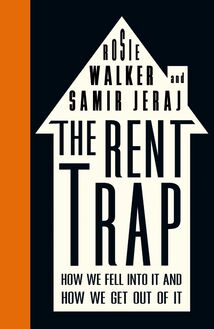-
 Univers
Univers
-
 Ebooks
Ebooks
-
 Livres audio
Livres audio
-
 Presse
Presse
-
 Podcasts
Podcasts
-
 BD
BD
-
 Documents
Documents
-
- Cours
- Révisions
- Ressources pédagogiques
- Sciences de l’éducation
- Manuels scolaires
- Langues
- Travaux de classe
- Annales de BEP
- Etudes supérieures
- Maternelle et primaire
- Fiches de lecture
- Orientation scolaire
- Méthodologie
- Corrigés de devoir
- Annales d’examens et concours
- Annales du bac
- Annales du brevet
- Rapports de stage
La lecture à portée de main
Vous pourrez modifier la taille du texte de cet ouvrage
Découvre YouScribe en t'inscrivant gratuitement
Je m'inscrisDécouvre YouScribe en t'inscrivant gratuitement
Je m'inscrisEn savoir plus
Vous pourrez modifier la taille du texte de cet ouvrage
En savoir plus

Description
Rosie Walker and Samir Jeraj offer the first critical account of what is really going on in the private rented sector and expose the powers conspiring to oppose regulation. A quarter of British MPs are landlords, rent strike is almost impossible and snap evictions are growing, but in the light of these hurdles The Rent Trap shows how to fight back.
Drawing on inspiration from movements in the UK, Europe and further afield, The Rent Trap coheres current experiences of those fighting the financial burdens, health risks and vicious behaviour of landlords in an attempt to put an end to the dominant narratives that normalise rent extraction and undermine our fundamental rights.
Published in partnership with the Left Book Club.
Series Preface
Acknowledgements
1. The Rent Trap
2. No Rights
3. No Money
4. No Home
5. No More?
6. The History of Private Renting
7. The Inequality Machine
8. What Else is There?
Appendix: How to Take Your Landlord to Court - Dirghayu Patel
Notes
Index
Sujets
Informations
| Publié par | Pluto Press |
| Date de parution | 20 mars 2016 |
| Nombre de lectures | 0 |
| EAN13 | 9781783717507 |
| Langue | English |
Informations légales : prix de location à la page 0,0498€. Cette information est donnée uniquement à titre indicatif conformément à la législation en vigueur.
Extrait
The Rent Trap
Join the Left Book Club
Membership of the Left Book Club costs just £40 a year, for which you will receive four specially commissioned or licensed titles each year, plus other members’ benefits, such as access to events, newsletters, and special offers on non-LBC titles.
To join please visit www.leftbookclub.com
Also available
Being Red A Politics for the Future Ken Livingstone
Syriza Inside the Labyrinth Kevin Ovenden Foreword by Paul Mason
Cut Out Living Without Welfare Jeremy Seabrook
The Rent Trap
How We Fell Into It and How We Get Out of It
Rosie Walker and Samir Jeraj
First published 2016 by Pluto Press
345 Archway Road, London N6 5AA
www.plutobooks.com
Copyright © Rosie Walker and Samir Jeraj 2016
The right of Rosie Walker and Samir Jeraj to be identified as the authors of this work has been asserted by them in accordance with the Copyright, Designs and Patents Act 1988.
The Left Book Club, founded in 2014, company number 9338285 pays homage to the original Left Book Club founded by Victor Gollancz in 1936.
British Library Cataloguing in Publication Data
A catalogue record for this book is available from the British Library
ISBN 978 0 7453 3646 6 Paperback
ISBN 978 1 7837 1749 1 PDF eBook
ISBN 978 1 7837 1751 4 Kindle eBook
ISBN 978 1 7837 1750 7 EPUB eBook
This book is printed on paper suitable for recycling and made from fully managed and sustained forest sources. Logging, pulping and manufacturing processes are expected to conform to the environmental standards of the country of origin.
Typeset by Stanford DTP Services, Northampton, England
Simultaneously printed in the European Union and United States of America
Contents
Series Preface
Acknowledgements
1 The Rent Trap
2 No Rights
3 No Money
4 No Home
5 No More?
6 The History of Private Renting
7 The Inequality Machine
8 What Else is There?
Appendix: How to Take Your Landlord to Court by Dirghayu Patel
Notes
Index
Series Preface
The first Left Book Club (1936–48) had 57,000 members, had distributed 2 million books, and had formed 1,200 workplace and local groups by the time it peaked in 1939. LBC members were active throughout the labour and radical movement at the time, and the Club became an educational mass movement, remodelling British public opinion and contributing substantially to the Labour landslide of 1945 and the construction of the welfare state.
Publisher Victor Gollancz, the driving force, saw the LBC as a movement against poverty, fascism, and the growing threat of war. He aimed to resist the tide of austerity and appeasement, and to present radical ideas for progressive social change in the interests of working people. The Club was about enlightenment, empowerment, and collective organisation.
The world today faces a crisis on the scale of the 1930s. Capitalism is trapped in a long-term crisis. Financialisation and austerity are shrinking demand, deepening the depression, and widening social inequalities. The social fabric is being torn apart. International relations are increasingly tense and militarised. War threatens on several fronts, while fascist and racist organisations are gaining ground across much of Europe. Global warming threatens the planet and the whole of humanity with climate catastrophe. Workplace organisation has been weakened, and social democratic parties have been hollowed out by acceptance of pro-market dogma. Society has become more atomised, and mainstream politics suffers an acute democratic deficit.
Yet the last decade has seen historically unprecedented levels of participation in street protest, implying a mass audience for radical alternatives. But socialist ideas are no longer, as in the immediate post-war period, ‘in the tea’. One of neoliberalism’s achievements has been to undermine ideas of solidarity, collective provision, and public service.
The Left Book Club aspires to meet the ideological challenge posed by the global crisis. Our aim is to offer high-quality books at affordable prices that are carefully selected to address the central issues of the day and to be accessible to a wide general audience. Our list represents the full range of progressive traditions, perspectives, and ideas. We hope the books will be used as the basis of reading circles, discussion groups, and other educational and cultural activities relevant to developing, sharing, and disseminating ideas for radical change in the interests of the common people at home and abroad.
The Left Book Club collective
Acknowledgements
We appreciate the generosity of everyone who agreed to be interviewed for this book, especially those who have the most to gain from renting remaining as it is. Thank you.
Thanks to Emily Wraith, Heather McRobie and Tansy Hoskins for sage advice on publishing. Thanks to Caroline Walker for arduous transcribing and eagle-eye editing, and to Charlie Tims for clear thinking and immense tolerance.
CHAPTER ONE
The Rent Trap
Rosie Walker
Corinne fishes in a cardboard box for some cups, boiling water in a pan on the hob because she hasn’t yet unpacked her kettle. ‘It’s annoying that the cooker is different every time you move’, she says, fiddling with the controls. She’s been in her new south London flat for a week, and likes it. There’s a huge cheese plant in the corner of the living room, and a decked balcony that she’s looking forward to sunbathing on.
She had been dreading telling her son that they were moving again. He celebrated his seventh birthday in the last few days at the old flat, and – to Corinne’s surprise – did not object to packing up his presents as soon as he had opened them. This is their fourth home in five years. ‘In the end, he took it well’, says Corinne. ‘I was surprised at how mature he was about it.’
Corinne (not her real name) is 33, with a well-paid job in policy for a campaigning charity. She has a good university degree, specialist skills, and is articulate and smart. But buying a home of any kind is out of the question, for good. Hers is no horror story: there have been no cockroaches, no dodgy wiring fixed with Sellotape by letting agents, no beds in sheds, no landlords with baseball bats. She is not on the run from violence or debt or the courts. She is simply a private renter in 2015, and her story is an everyday one.
Her son could have found out about the house move by accident, when a woman from a well-known high street letting agent tried to let herself into their home without permission, to take photographs.
Corinne had been paying £1,150 per month, excluding bills, for a two-bedroom flat in south London near to her job – an amount that used up most of her salary. ‘It was nice; we stayed for two years’, Corinne says, in a way that makes two years sound like a lifetime. After two years, the landlord demanded an extra £100 a month, though no improvements had been made to the flat. Corinne could not afford it, and negotiated the increase down to an extra £25 per month. Her landlord owns 90 flats in London and Kent.
Shortly afterwards, the letting agent who for legal reasons we shall call Denfields (not its real name) telephoned to ask if they could come and take photos. Corinne contacted her own letting agent to ask what was going on. ‘They said “haven’t you got the letter? Your landlord’s putting the rent up to £1,300, effective from next month.” But I hadn’t been told anything’, says Corinne.
Corinne went away for a week, trying to ignore daily emails and phone calls from Denfields, saying they wanted to go to her flat and take photos. When she returned, she called them and asked what they wanted to take photos for. ‘“I live here!” I said. “I haven’t said I’m moving out!”’ She called her own letting agent who said they didn’t know. ‘Then, within an hour, they’d emailed me a Section 21, and told me that a rent increase of £125 per month applied to the two-month notice period.’
Corinne contacted Renters’ Rights London, who explained that rent cannot legally be increased in this way. But Section 21, the part of the 1988 Housing Act that allows a landlord to evict with two months’ notice and without having to give a reason, cannot, in most cases, be legally challenged. For Corinne, it was devastating. ‘The landlord had total disregard for his tenants. And to try to make me pay an extra £250 at the end, when he was the one making me move out and leave the community my son goes to school in – I was furious.’
Denfields kept up the bombardment of calls, demanding to be let in to take photos, but Corinne was busy at work. They even emailed to accuse her of changing the locks – a legal right that tenants have, but that Corinne had not used. It was then that she realised they had been trying to get in without her permission. Tenants must give explicit permission for anyone – even the landlord or agent – to enter their home, even if they have keys, but the agents from Denfields seemed unaware of this law and emailed Corinne’s landlord to say that Corinne was ‘not co-operating’.
Corinne’s son had had a difficult term at school, but had eventually settled. She didn’t want to tell him the news until she had secured a new home, so she could say for certain whether or not he would have to move schools, and she knew that agents coming to take photos of his home without explanation would unsettle him. ‘I didn’t want him lying in bed at night worrying about all the possibilities, and where we might end up’, she says. Besides, she didn’t want her ‘whole life on show’ online.
When she explained this to her landlord, adding that she had no legal obligation to pay any extra rent without a new tenancy agreement, he replied that if she ‘co-operated’, she wouldn’t have to pay the £250. ‘I felt that was like saying “You’ve got less money than me, so I’m sure you’ve got lower levels of integrity”,’ Corinne says. ‘As if I were only pretending to care, and that it could easily be remedied with £250 – which was mine anyway.
-
 Univers
Univers
-
 Ebooks
Ebooks
-
 Livres audio
Livres audio
-
 Presse
Presse
-
 Podcasts
Podcasts
-
 BD
BD
-
 Documents
Documents
-
Jeunesse
-
Littérature
-
Ressources professionnelles
-
Santé et bien-être
-
Savoirs
-
Education
-
Loisirs et hobbies
-
Art, musique et cinéma
-
Actualité et débat de société
-
Jeunesse
-
Littérature
-
Ressources professionnelles
-
Santé et bien-être
-
Savoirs
-
Education
-
Loisirs et hobbies
-
Art, musique et cinéma
-
Actualité et débat de société
-
Actualités
-
Lifestyle
-
Presse jeunesse
-
Presse professionnelle
-
Pratique
-
Presse sportive
-
Presse internationale
-
Culture & Médias
-
Action et Aventures
-
Science-fiction et Fantasy
-
Société
-
Jeunesse
-
Littérature
-
Ressources professionnelles
-
Santé et bien-être
-
Savoirs
-
Education
-
Loisirs et hobbies
-
Art, musique et cinéma
-
Actualité et débat de société
- Cours
- Révisions
- Ressources pédagogiques
- Sciences de l’éducation
- Manuels scolaires
- Langues
- Travaux de classe
- Annales de BEP
- Etudes supérieures
- Maternelle et primaire
- Fiches de lecture
- Orientation scolaire
- Méthodologie
- Corrigés de devoir
- Annales d’examens et concours
- Annales du bac
- Annales du brevet
- Rapports de stage













